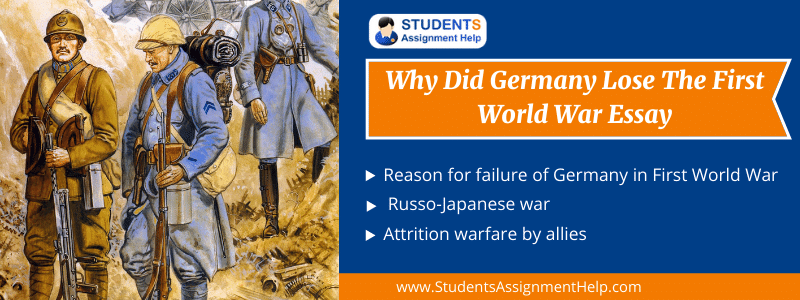Why Did Germany Lose The First World War Essay

The first world war destructs the base of the economy of many states across the globe and one such state is Germany that lost the war due to several reasons. It’s not only the first world war but any war that hamper the peace and law and order of any state involvement in such war and first world war.
The major reason behind the first world war was the assassination of Archduke Franz Ferdinand whereas many historians reiterate Germany as the core reason for the first world war. Before the occurrence of such war, tension was already built up in many states about the consequences of war. As it is noteworthy that every war comes up with drastic consequences that not only destroy the states or their economies but affect individuals as well.
Every state involved in this first world war directly or indirectly had to face the consequences of the same while every state-run in the race of being superior to others that led to the war unavoidable. Moreover, in the first world war, most of the European countries shake their hands that resulted in Germany meeting its alliance with Austria Hungary, Bulgaria, and the Ottoman empire.
But this first world war destroys Germany’s economy severely which resulted in the bankruptcy of the economy. At the end of the first world war, the treaty of Versailles on 28 June 1919 was signed by Germany and its allied states. Notably, there are three main reasons why Germany and its alliance lost the first world war and face deteriorated results thereto.
Reason for failure of Germany in First World War
The three main grounds why Germany lost the first world war are the Schlieffen plan, nationalism, and attraction warfare that operated by its alliance.
The very first ground of failure was the Schlieffen plan that was introduced by Alfred Von Schlieffen and revised by Moltke led the state to fight a two-front war that was next to impossible to win. The plan was thought to secure the victory In the first World War but coins turn to the adverse side and led the state to fail.
Flexible Rates Compatible With Everyone’s Budget
Hire a Professional Essay & Assignment Writer for completing your Academic Assessments
This plan was under the supervision of Kaiser Wilhelm 2 and against French, British, Americans, and Belgian on the western front. On the other hand, Germany was also fighting on the eastern front against Russia. Such war ended with the treaty of Brest-Lipovsky in 1918 as at this time the state didn’t possess a sufficient amount of money to send the troops on both fronts.
At the commencement of the first world war, Britain was not the prime party to it but later with the participation of the state effect in failure of Schlieffen plan. The entrance of the British and resistance of Belgian was not expected by Germany that pose a threat to the state and its allies.
Russo-Japanese war
The failure of Russo- Japanese war also poses a threat to Germany in the first world war, as Germany was not at all concerned about the Russian mobilization. Germany and its allies face humiliation in the Russo-Japanese war that led to Russia capture territory instantly and shifted to conquer Berlin.
Germany later realizes what it lost in the major two years that are 1916 and 1917 which were identified as stalemate years. As before the occurrence of the first world war, the state believed itself as one of the powerful states in war and was overconfident about its victory due to nationalism.
The battle of lost opportunities was only the yardstick means for Germany to win against Britain but the plans of Germany were discovered by Russians that led to shedding off from the victory race. This was the battle of Junaid that take place where Germany had the chance to weaken the British royal navy but they failed.
All such failures of Germany and its allies lowered the spirit of nationalism and the battle of Verdun that was majorly the last fight resulted in the loss of approximately four lakhs of soldiers of Germany and made it impossible for them to win.
Buy high-quality essays & assignment writing as per particular university, high school or college by UK, USA & Australian Writers
Attrition warfare by allies
The major failure setback reason for Germany is the operation of attrition warfare by allies which compel the state to surrender ultimately. The attrition warfare is the method used by the state to secure their victory in the war by consistently declining in military personnel as well as materially other states but it turns against Germany when Britain uses the blockade to stop the food, oil, rubber, and fertilizers. This ultimately led to starvation in the country that causes the emergence of protests by the citizen to end the war or remove the blockade.
Stuck with a lot of homework assignments and feeling stressed ?
Take professional academic assistance & Get 100% Plagiarism free papers


